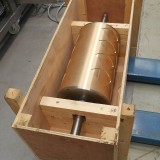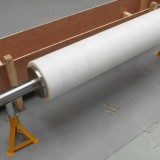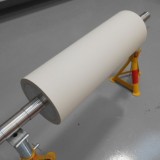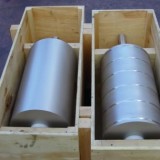Cutter and Docker Rollers
Cutter segments allow the user to make design changes without manufacturing a complete new roller. The Arrow cutter has a stainless steel mandrel base roller. Segments are fitted to the mandrel and locked in place by threaded rings. This type of construction has many benefits for the user including interchangeable designs and introduction of new products. Cutter segments can be manufactured in either bronze or plastic. All materials are food grade approved. Teflon coatings can be applied to the cutters to reduce dough adhesion. All types of dough sheet – wheat, potato flake and corn – can be cut using either plastic or bronze materials. New cutter and docker segments can be supplied for the customer to fit. Segment assembly is an easy process. A positive drive feature on each ring eliminates any pitch or phasing errors. Segments are a good production class fit with the mandrel and this helps to make the whole assembly a robust construction. Technical Specifications Key Features Stainless steel mandrel End locking rings Provision for either drive gear or pulley Deep groove ball bearings on shaft Plastic and bronze segments Options Spherical roller bearings Scrapless designs Teflon coatings for improved dough release Combined cutter/docker rollers Bearing housings can be...
read moreRubber Coated Anvil Rollers for Cutters and Moulders
Large forces can be used when either cutting or moulding dough pieces. At Arrow, we use a dual rubber compound for anvil rollers to reduce the impact of these large forces. An inner layer of softer compound creates some shock absorbing capability especially when the roller is driven towards either the cutter or die roll. The outer layer remains at full hardness in order to provide good cutting or moulding performance. There are two styles of anvil roller – external bearing and internal bearing arrangements. The rubber compounds are bonded to a stainless steel mandrel. For an external design, the shaft is fabricated into the mandrel and the bearings require separate housings for support, grease retention, etc. Alternatively, the internal design has bearings mounted inside the mandrel construction. The shaft does not rotate and can be simply supported in yokes allowing the mandrel to rotate freely on the bearings. Anvil rollers can be manufactured up to 1550mm long by 300mm outer diameter. The depth of rubber compound can be as much as 45mm radially. In addition to anvil rollers, Arrow manufactures a range of conveyor drum drive rollers. Typically, rollers are a single hardness rubber compound and the depth of the rubber is much less than an anvil roller. Arrow uses Food Grade rubber compounds in all its products. Also, we can provide white or blue compounds depending upon customer requirements. Technical Specifications Key Features Stainless steel mandrel Dual hardness rubber compound construction White colour rubber compounds External bearing arrangement Options Blue compounds are available Internal bearing arrangement Bearing housings Cutter rollers Moulding...
read moreSheeting Rollers
High quality rollers contribute to the efficient running of a sheeting line. At Arrow, we design rollers to be strong and give good service. We use through-shaft designs and select bearings to give a service life in excess of five years continuous operation. Arrow manufactures rollers from 165mm to 455mm diameter and from 300mm to 1460mm long. Roller options include chilled rolls, Teflon coated rolls and hardened rolls. Arrow supplies scrapers suited to the roll surface. The Teflon coated rolls have a stainless steel substrate to prevent erosion of the surface coating. Alternatively, Arrow’s novel dough sheet air release system can be supplied for horizontal pairs of sheeting rollers. The larger chilled rolls have multiple cooling passages close to the surface. This gives a high velocity coolant flow and dramatically increases heat transfer at the surface. Less coolant is required to hold the roll surface at temperature giving the user lower operating costs. Rolls are assembled using a liquid nitrogen process involving interference fits between components. Less residual stress is created in the rollers when assembled this way compared with welding. Technical Specifications Key Features Stainless steel construction Ground surface finishes Through shaft design Pre-loaded spherical roller bearings Options Alloy steel hardened rolls Bead blast finish Teflon coat with stainless steel substrate finish Profiled rolls Chilled rolls Stainless steel hardened rolls ‘Crowned’ rolls for improved dough piece weight...
read more



